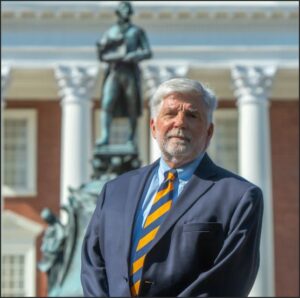
Bert Ellis, UVa graduate, president of The Jefferson Council, and newly appointed to the University of Virginia Board of Trustees, is highlighted in The Washington Post article on the alumni-led free speech movement.
by James A. Bacon
Every once in a while The Washington Post reminds us of the kind of newspaper it used to be — capable of producing balanced journalism. Education reporter Susan Svrluga has published an article describing the rise of what I (not she) call the alumni rebellion. She cites the concerns of Virginia-based organizations — the Jefferson Council (on whose board I serve), the Spirit of VMI, and the General’s Redoubt — as well as allied groups in Princeton, MIT and other nationally known universities about the erosion of free speech on college campuses.
Svrluga doesn’t squeeze our statements into a left-wing narrative, she doesn’t mischaracterize our concerns, and she quotes us fairly, accurately, and in context. To be sure, she gives space to those who minimize our allegations about the state of higher-ed today — as it is her obligation to do. It’s important for readers to know that not everyone agrees with us.
The contrast with Ian Shapira, The Washington Post author of repeated hit jobs on the Virginia Military Institute, is dramatic. Shapira epitomizes the new school of journalism. He started with his narrative of VMI as a systemically racist institution, uncritically repeated information that confirmed his belief, and ignored or sought to discredit information that did not. He did go through the motions of producing pro-forma statements for the “other side of the story,” but he never let them interrupt his pre-determined narrative.
So, kudos to Svrluga for letting us tell our story.
While I am grateful for Svrluga highlighting the new alumni-led free-speech movement, I do believed that she missed a critical angle. By way of preface, I need to quote UVa spokesman Brian Coy and renowned political scientist Larry Sabato.
Coy spoke of recent initiatives at UVa to address free speech and intellectual diversity issues. The university has overhauled the curriculum to include classes designed to get students to debate ideas respectfully. President Jim Ryan has written about the need to be “empathetic speakers and generous listeners.” And UVa has adopted a statement upholding the importance of free expression and free inquiry.
Svrluga also quoted Sabato as minimizing the movement. “If there is one thing that is common to every university in the world, it is alumni who believe their school started going downhill after they graduated,” he wrote. But UVa, he said, is a highly-regarded university that attracts “diverse and talented students from all over the globe.”
I think it’s fair to say that UVa is a less intolerant place than many other elite universities. Young Americans for Freedom has been able to bring outside conservative speakers to the university to speak, and the speakers have been treated respectfully.
However, neither Coy nor Sabato addressed in their remarks the phenomenon of compelled speech in the form of Maoist-style self-criticism in diversity training sessions or mandatory, McCarthy-esque Diversity, Equity & Inclusion statements required of employees and job applicants. Neither did they address the increasing intellectual conformity resulting from the retirement of Baby Boomer faculty members reflecting a wide range of views and their replacement with overwhelmingly left-of-center newcomers.
Carl Neuss, an outspoken leader of the Cornell Free Speech Alliance, vigorously argues that “free speech” is the tip of the iceberg of issues facing academia today. The steady leftward drift of the faculty results in a narrower range of viewpoints being treated respectfully and narrows the parameters of permissible discourse. Allowing people to speak without being shouted down or otherwise harassed is applying a minimalist standard. The root problem is ideological orthodoxy, which creates intellectual conformity, intolerance of dissenting views, and informal methods of suppressing free expression. That’s as true of UVa as it is of Cornell.
Svrluga covered a lot of ground in her story, and she couldn’t explore every angle. But someone in the mainstream media needs to write about the steady drift toward compelled speech on college campuses. Who better than her to take that issue on?
Full disclosure: The author serves as vice president-communications for The Jefferson Council.


